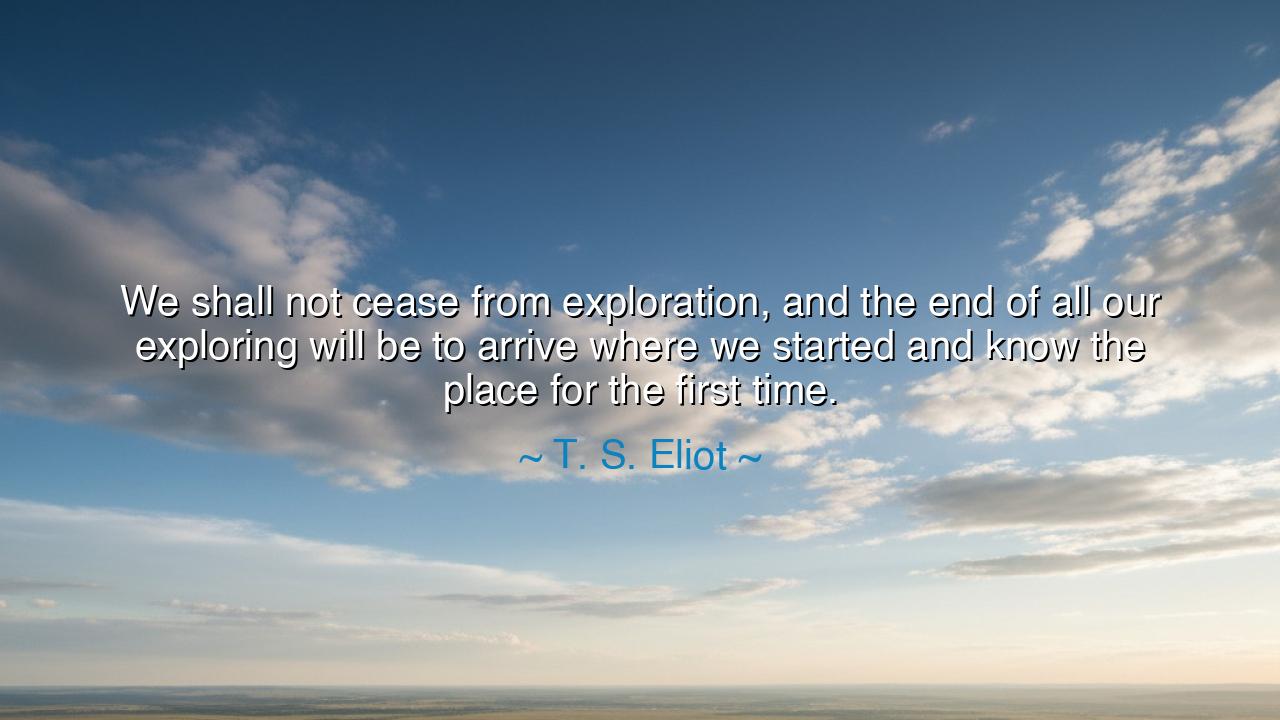
We shall not cease from exploration, and the end of all our
We shall not cease from exploration, and the end of all our exploring will be to arrive where we started and know the place for the first time.






The words of T. S. Eliot, poet of the modern age and seeker of timeless truth, flow like a river returning to its source: “We shall not cease from exploration, and the end of all our exploring will be to arrive where we started and know the place for the first time.” In this utterance, Eliot reveals the paradox of the human journey—that we wander far into the unknown, only to discover that the greatest revelation is found in seeing anew what was always before us. Exploration is not only outward but inward, not only into the world but into the soul.
The meaning begins with the eternal hunger of humanity to seek. Men sail oceans, scale mountains, study the stars, and probe the mysteries of existence. Yet no matter how far they go, the journey is not complete until they return to the origin, and see it with the eyes transformed by their trials. A child sees a home as shelter; the wanderer who returns sees it as belonging. Thus, Eliot teaches that the true fruit of exploration is not in discovering foreign lands alone, but in returning to one’s beginning with wisdom, perceiving with clarity what once was ordinary.
The origin of these words lies in Eliot’s great work, Four Quartets, where he wrestled with time, eternity, and the human condition. Written after years of personal searching—through despair, war, and his own spiritual awakening—they reflect his conviction that man’s ceaseless striving finds its fulfillment not in escaping his beginnings, but in sanctifying them through knowledge and transformation. In these words, Eliot echoes the mystics of old, who said the path to enlightenment leads us back to the heart, where the eternal has always dwelt.
History bears witness to this truth. Consider the life of Odysseus, whose epic wanderings took him across seas filled with monsters and gods. For years he longed for his homeland, Ithaca. When at last he returned, it was the same soil upon which he was born, but he was no longer the same man. His explorations had changed his sight; he knew his homeland for the first time, not as a youth but as a man tempered by struggle. So too does Eliot remind us that the circle of exploration ends not in foreign conquest, but in renewed recognition of what we had overlooked.
The deeper teaching is this: every life is a cycle of departure and return. We leave innocence in search of experience, only to discover that true wisdom makes us treasure innocence anew. We pursue knowledge in distant lands, only to discover that meaning lies close to our hearts. We seek the divine in lofty heights, only to find it in the silence within. Exploration without return is incomplete, for it is in the return that meaning is made whole.
The lesson for you, seeker, is to embrace exploration not as escape, but as transformation. Go forth bravely into the world—learn, suffer, strive, and question. But do not despise your beginnings. When you return to the familiar, look again, for you will see with new eyes. The home, the family, the earth, the soul—they will appear as if discovered for the first time, radiant with meaning because you have grown into the vision to perceive them.
Practical actions follow. Cultivate curiosity, but balance it with reflection. Travel and study widely, but remember to return and see what was once ordinary with reverence. When you revisit old places, do not dismiss them as unchanged; ask how you yourself have changed in perceiving them. Take time to meditate on your origins—your childhood, your roots, your earliest lessons—and see how they appear now, in the light of your growth. In doing so, you will find the eternal in the ordinary, and the sacred in the familiar.
So remember, children of tomorrow: we shall not cease from exploration, for it is our nature to seek. But know this—the end of all seeking is not to flee from beginnings, but to return to them renewed. When you arrive again at the place from which you started, may you behold it with awakened eyes, and know it for the first time, as though it had always waited for you.






AAdministratorAdministrator
Welcome, honored guests. Please leave a comment, we will respond soon